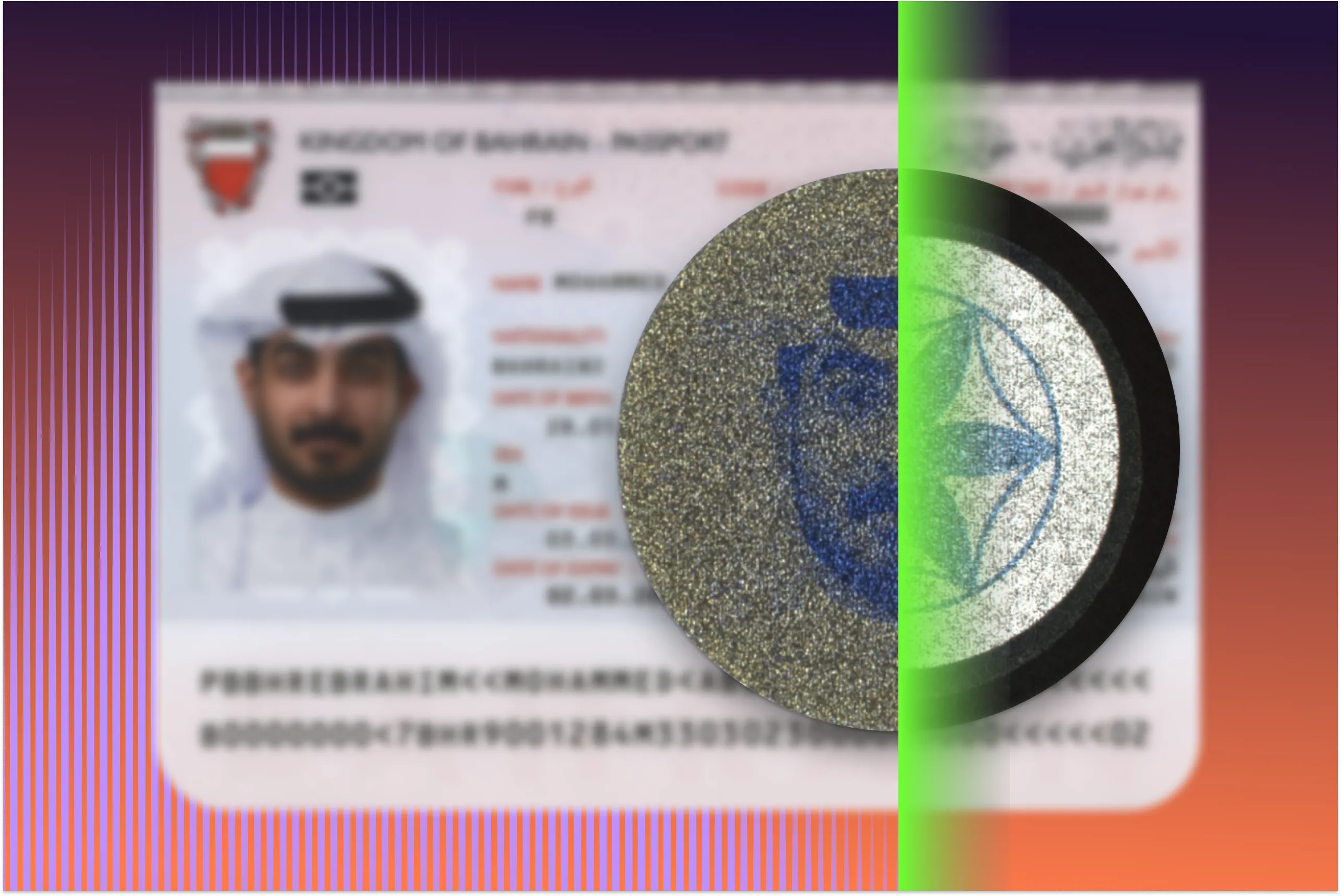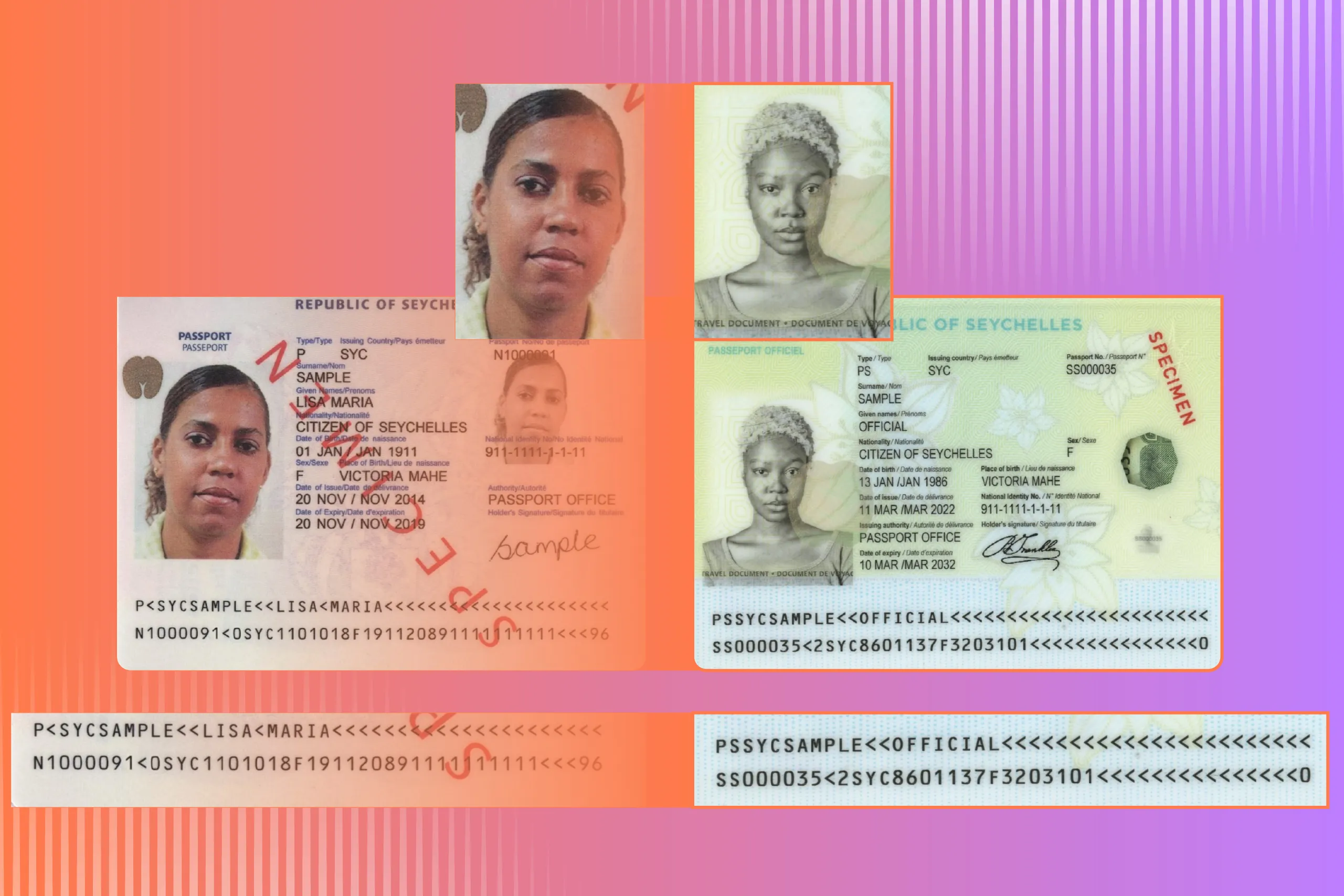Updated June 30, 2025
Among the 195 countries on Earth, as specified by the UN, there’s a distinct group of states that stand out. Typically, these countries have much smaller populations and are often located remotely. As a result, their passports—the most typical travel documents—appear far less frequently in identity verification (IDV) scenarios compared to IDs from large countries in Europe, Africa, Asia, or the Americas.
They may be uncommon, but they’re no less important than any other documents. In fact, these passports are also modern and unique in their design and features.
With one of the most comprehensive document template databases in the world, Regula is well-positioned to showcase examples of the rarest passports—to help broaden the understanding of these lesser-seen, yet noteworthy documents.
Get posts like this in your inbox with the bi-weekly Regula Blog Digest!
1. Jamaican passport, 2023 series
Potential number of holders, based on the country’s population (according to the World Bank data as of 2023): 2,839,786

The Jamaican passport is the first example of a CARICOM travel document, as the country is a member of the Caribbean Community alongside 14 other nations. This is indicated by the CARICOM inscription and logo, displayed above the country’s coat of arms on the passport cover.
In 2023, Jamaica introduced biometric passports, which store a digital version of the holder’s biographical data on an embedded chip. The country also joined ICAO’s Public Key Directory—a global network that enables secure verification of biometric travel documents.
The upgraded document contains a standard set of data in English, the country’s official language, and is secured with multiple features, including UV overprints. Since most citizens still hold the previous series, the 2023 edition can be considered one of the rarest passports in the world.

Under UV light, the 2023 series of Jamaican passports reveals bright security features, including the country’s coat of arms and palm trees—both symbolic of Jamaica.
What is the CARICOM passport?
This is a travel document issued by member states of the Caribbean Community, such as Antigua and Barbuda, Belize, Jamaica, Guyana, and St. Lucia. (By the way, many of these travel documents are also among the rarest passports in the world.) It was created to simplify both intra-regional and international travel for citizens of the Community.
These passports share a common design, featuring the inscription “Caribbean Community” and the organization’s logo on a dark blue cover for ordinary travel documents.
Currently, not all of the 15 member countries have adopted the CARICOM passport, first introduced by Suriname in 2005. For example, Montserrat has not yet rolled out its version.
2. East Timorese passport, 2017 series
Potential number of holders, based on the country’s population: 1,384,286

Located in Southeast Asia and independent since 2002, Timor-Leste, also known as East Timor, now boasts a modern travel document. Since the 2017 series, all passports issued by the country are biometric.
East Timorese passports feature polycarbonate data pages with information presented in Portuguese, one of the country’s two official languages, alongside Tetum. Interestingly, in addition to standard personal details, the passport specifies the holder’s height.
The data page also includes a Multiple Laser Image (MLI) with the holder’s photo and date of birth, along with Optically Variable Ink (OVI), a hologram, and a UV feature. This makes the document not only one of the rarest passports, but also one of the most secure.

The East Timorese flag and the country’s name appear under UV light on the data page.
3. Trinidad and Tobago, 2019 series
Potential number of holders, based on the country’s population: 1,367,510

As a document issued by a member of the Caribbean Community, this state’s passport features the CARICOM logo and inscription on the cover. The current version, introduced in 2019, is ICAO-compliant and machine-readable but non-biometric.
The Trinidad and Tobago passport includes standard personal identification details presented in English—the country’s official language—and is secured with several features such as a ghost portrait, watermark, and a UV feature.

A UV feature in the 2019 Trinidad and Tobago passport highlights the country’s fauna.
4. Fijian passport, 2019 series
Potential number of holders, based on the country’s population: 924,145

Fiji, an island nation in Melanesia, is next on the list of the rarest passports—and it's another example of a modern travel document.
The country began issuing biometric passports in 2019. The upgraded series has a polycarbonate data page and includes advanced security features, such as an MLI ghost portrait that also displays the holder’s date of birth and hologram. The embedded chip stores biometric data, such as a photo. All holder information is presented in English.

When exposed to UV light, the passport reveals a drua—the iconic Fijian double canoe—which is less visible to the naked eye under normal lighting. This symbol also appears in the country’s coat of arms on the cover.
5. Comorian passport, 2012 series
Potential number of holders, based on the country’s population: 850,387

The passport issued by the Union of the Comoros—one of Africa’s smallest countries, made up of three islands off the southeast coast—is notable for several reasons.
First, it presents data in both French and Arabic—a rare combination in travel documents. Second, in addition to standard identification details, the passport includes extra information such as the holder’s eye and hair color and height, which is more commonly found in identity cards or driver’s licenses. This data appears on the third page of one of the rarest passports in the world.
Also, the current 2012 version of the document is biometric.

The Comorian passport also features a vivid UV design, including a color-shifting security thread with microprinting, the country’s coat of arms and flag, and the major islands.
6. Guyanese passport, 2015 and 2025 series
Potential number of holders, based on the country’s population: 826,353

The Guyanese passport from 2015 is non-biometric.
One of the key features of the 2015 series Guyanese passport—which still dominates in circulation—is its shorter validity period. Unlike most countries that issue passports valid for ten years, this South American nation limits theirs to just five. Since 2007, the document has been machine-readable and CARICOM-compliant.
The 2015 series is non-biometric and comprises a standard set of identification information presented in English. Key security features include a ghost portrait, watermark, UV features, and microprinting.
In 2025, Guyana introduced its first biometric passport, featuring an updated design, advanced security features, and an embedded electronic chip. The new e-passport also has a standard validity period of ten years.

Starting in February 2025, Guyanese citizens can obtain an upgraded biometric passport—currently, one of the rarest passports in the world.
7. Maldivian passport, 2016 series
Potential number of holders, based on the country’s population: 525,994

As a highly visited tourist destination, the Maldives also boasts a highly secure travel document. The country has been issued biometric passports since 2007. The latest series, introduced in 2016, features a polycarbonate data page, an RFID chip, a hologram, OVI elements, MLI with the holder’s portrait and date of birth, and updated background and cover designs.

The UV feature in the 2016 Maldivian passport reveals the island nation's outlines and key symbols.
The passport holder’s data is printed in English, while text fields and cover inscriptions are also presented in Dhivehi—the official language of the Maldives. Dhivehi belongs to the Indo-Aryan language family and uses a unique, non-Latin script. The unique Maldivian language is another reason why this document is considered one of the rarest passports in the world.
8. Bahamian passport, 2017 series
Potential number of holders, based on the country’s population: 399,440

The next travel document on the list is held by fewer than half a million people—citizens of the Bahamas.
Although the country is a member of the Caribbean Community, its navy-blue passport isn’t CARICOM-compliant. Still, unlike some other states in the region, it’s a biometric document. The current version, introduced in 2017, features a polycarbonate data page, hologram, and transparent window.
As the Bahamas is one of the UK’s Commonwealth realms, the passport also includes the holder’s National Insurance Number. This number links to government systems, including taxation, social welfare, and access to online government services.
9. Barbados passport, 2022 series
Potential number of holders, based on the country’s population: 282,336

Barbados issues one of the most powerful passports in the Caribbean, offering access to 161 visa-free destinations. The latest 2022 series is issued in line with CARICOM standards and features a paper-based data page with the holder’s identification data printed in English and French, along with additional text fields in Spanish.
Although the passport lacks dynamic security features such as OVI elements, it includes an embedded RFID chip that significantly enhances its security.
.webp)
Under UV light, the Barbados passport reveals green overprints that match the color hues used on the data page.
10. St. Vincent and the Grenadines, 2021 series
Potential number of holders, based on the country’s population: 101,323

Another Caribbean Community member with a biometric travel document is St. Vincent and the Grenadines. The country was one of the early adopters of the regional CARICOM standard, issuing a compliant passport back in 2005. Since 2014, the nation’s passport has been biometric, including the current version introduced in 2021.
As one of the world’s rarest passports, the St. Vincent and the Grenadines travel document contains a standard data set in English and security features like a ghost portrait and UV overprints.
11. Antiguan and Barbudan passport, 2017 series
Potential number of holders, based on the country’s population: 93,316

Next on our list of the world’s rarest passports is Antigua and Barbuda. A member of the Caribbean Community, the country issues biometric, CARICOM-compliant travel documents. The passport presents data in English as well as Antiguan and Barbudan Creole, an English-based creole language.
The current 2017 series is a vivid example of a bright design inspired by local nature—a distinctive feature often found in passports issued by island nations. The Antiguan and Barbudan passport includes numerous pictorial motifs on the data page, inside covers, and UV elements, showcasing the uniqueness of the country’s flora and fauna.

The Antiguan and Barbudan passport proudly showcases the richness of the nation’s natural environment, featuring the hawksbill turtle—a critically endangered species.
12. Commonwealth of Dominica passport, 2021 series
Potential number of holders, based on the country’s population: 66,510

The final Caribbean country on this list is the Commonwealth of Dominica, whose passport is another example of a biometric travel document.
The current 2021 series is entirely in English. It features updated background patterns on the data and visa pages, along with a range of modern security features like a watermark, intaglio printing, and multiple UV features, including a fluorescent serial number, transparent windows, and holograms. Combined with an embedded RFID chip, these features make it a strong example of a well-secured travel document.

When examined under UV light, the Commonwealth of Dominica passport discovers bright patterns and depictions of native wildlife.
13. Palauan passport, 2006 series
Potential number of holders, based on the country’s population: 17,727

The travel document of this island nation in Micronesia is non-biometric, fully ICAO-compliant—and considered one of the rarest passports in the world. Additionally, Palauan passport holders can enjoy visa-free access to over 120 countries. That’s impressive for a country with a population of just about 18,000 people!
The data, presented in English, includes the holder’s standard personal details. The Palauan passport includes security features such as a ghost portrait, UV elements, a watermark, and background patterns featuring the nation’s vibrant flag.
14. Tuvaluan passport, 2017 series
Potential number of holders, based on the country’s population: 9,816

As one of the rarest passports in the world, the Tuvaluan travel document also ranks high in terms of travel freedom. Citizens of this island nation in Polynesia can visit over 120 states without a visa.
The passport meets ICAO requirements—it's machine-readable, includes standard identification information, and is valid for ten years. Security features include UV overprints and watermarks, along with a bright background pattern on the data page, which can pose challenges for online identity verification.
15. Vatican passport, 2017 series
Potential number of holders, based on the Vatican City State’s population: approximately 800+

On this list, the rarest passport in the world belongs to residents of Vatican City State. In practice, there are two types of travel documents: service and diplomatic passports issued by the Holy See, and ordinary passports for regular residents issued by Vatican City State. Depending on the type, the passport may be valid for either three or ten years.
The current 2017 series is biometric and has a polycarbonate data page with identification information in Italian and English. Security features include UV elements, holograms, and watermarks, making the Vatican passport highly resistant to counterfeiting.

When exposed to UV light, the Vatican passport displays the state’s coat of arms.
Bonus: The Sovereign Military Order of Malta passport, 2005 series

This travel document can easily impress border control officers. The Sovereign Military Order of Malta, also known as the Knights of Malta, represents a sovereign nation with a 1,000-year history, its own constitution, and government, but with no territory. This makes it stand apart from the Vatican City State.
The Order issues diplomatic (with a red cover) and service passports (with a black one), which currently exist in the 2005 series. Both are biometric and ICAO-compliant and have the same layout, with data in French and the specific country code—XOM. The number of Order passports in circulation is about 500 for the diplomatic version and around 50 for the service one.
The major challenge in verifying rare passports
This list is subjective, as population size is one of the key criteria used to select the passports featured. In practice, many more identity documents could be identified as “rare” or “uncommon” by border control officers and IDV specialists around the world.
Presenting a fully legitimate but less typical passport as proof of identity can be a challenge—for both IDV software and human inspectors. Whether the process is automated or manual, it requires access to a reliable reference database to compare the presented document against an official specimen. That’s where Regula comes in.
Regula Document Reader SDK is powered by the world’s largest document template database, constantly maintained and updated by Regula specialists. For manual checks, inspectors can use Regula IRS Passport, which offers high-quality images and detailed descriptions of documents, including their security features and printing techniques.
💡Since many passports presented are electronic, you can also rely on advanced NFC verification technology to verify them.
Not sure whether a rare or a common passport is covered in our databases? Book a call to explore your IDV requirements and get all the details.



.webp)

